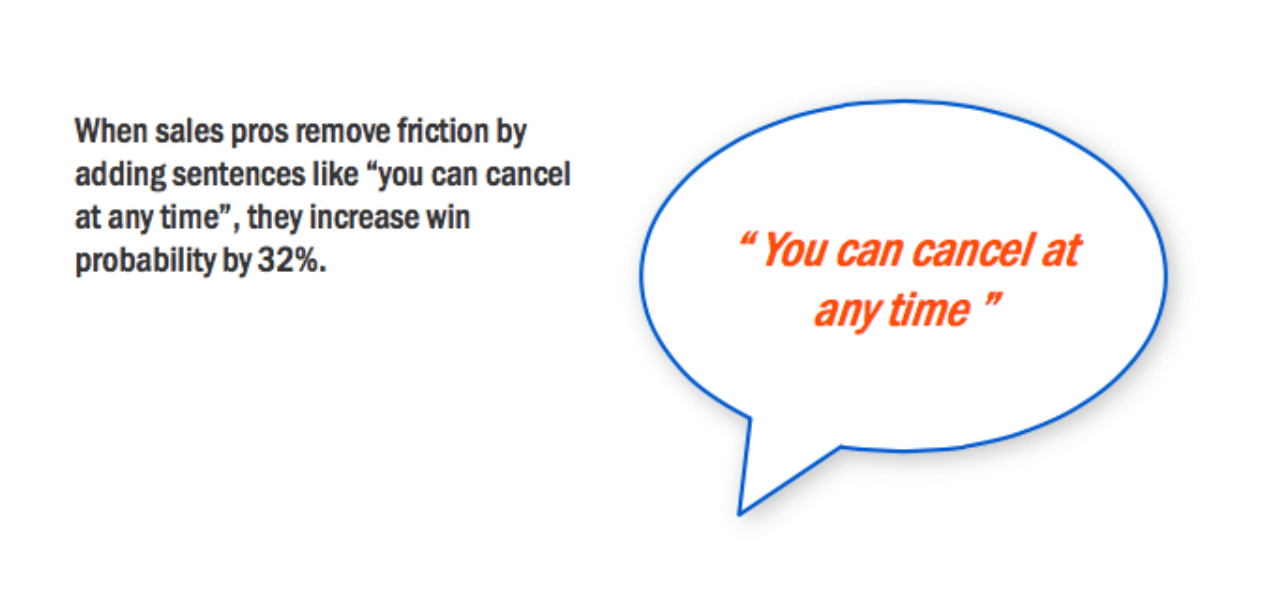How to Increase Sales Win-Rates By 32% Using “Risk-Reversal Language” – Backed by science
January 22, 2017
. . .
As I stared intensely at the contract, a knot formed in my stomach. I was on the cusp of finalizing the purchase of some marketing technology for our team at Gong. I had aggressively championed this internally to get everyone’s buy-in, and had been excited to move forward and get this thing implemented. Until now. Now that push came to shove and I was on the chopping block for making the right purchasing decision, crippling self-talk dominated the dialogue running through my head: What if it doesn’t work out? What if the sales rep overpromised on something important? What if this whole project falls apart and we’re stuck in a long-term contract? What if I get fired for making a stupid decision? At a gut-level, I had finally understood the power of IBM’s old slogan: “Nobody ever got fired for purchasing from IBM.” As all these thoughts raced through my head, I almost forgot I was on the phone with the sales rep who was trying to sell this technology to me. “Chris, I forgot to mention: our success is tied to your success. If for whatever reason you change your mind, you can cancel your contract at any time. No hard feelings.” And just like that, the anxiety dissipated. He pointed out the language outlining this policy in the contract, and I signed it. It felt great.Death, Taxes, and Pre-Purchase Anxiety Are the Only Certain Things In This World
Pre-purchase anxiety and sudden doubts are common to almost any B2B buyer making a non-trivial purchase. An excited prospect who believes your value proposition is a “no brainer” can instantly turn cold and ignore your calls when it’s finally time to execute an agreement. When it’s time to sit down and put ink to the contract, anxiety takes over. After all, they’re spending a bushel of their company’s cash. If they squander that, there may be painful consequences (including getting kicked to the curb). Unsurprisingly, what we at Gong refer to as “risk-reversal” language greatly increases win-rates because it banishes this pre-purchase anxiety head-on. Let’s see what analyzing 25,537 sales conversations using artificial intelligence can tell us about just how impactful risk-reversal language is on our sales success and win-rates…The Correlation Between Win-Rate Spikes, and a Liberal Use of Risk-Reversal Language
If you’re striving to spike your sales team’s win-rates, your lowest hanging fruit is in getting them to manage their talk-to-listen ratio effectively. But your next major opportunity for improvement lies in soothing your prospect’s pre-purchase anxiety and mitigating their risk with a liberal use of “risk-reversal language.” Translation: if you want an easy way to increase your win-rates, you should proactively, frequently, and liberally talk about deal terms that are designed to protect the customer from risk when making a purchase:- Easy cancellations
- 90 day opt-outs
- Quick and easy implementation or setup
- No long-term contracts
- SLAs (service level agreements)
- Even money-back guarantees
 When risk-reversal language such as this is used generously by sales professionals, we’ve seen win-rates skyrocket on average 32%.
That’s nothing to sneeze at.
When risk-reversal language such as this is used generously by sales professionals, we’ve seen win-rates skyrocket on average 32%.
That’s nothing to sneeze at.